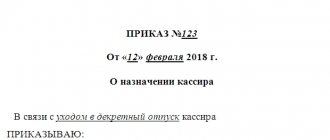How to announce
The procedure for applying disciplinary sanctions is determined by Art. 193 Labor Code of the Russian Federation. Failure to comply with the procedure established by law will be grounds for declaring the measures taken illegal. Let's look at how to reprimand an employee step by step and give an example of an order. To bring the offender to justice, the fact of the offense must first be recorded. This will help:
- memorandum (in case of failure to fulfill official duties);
- act (for example, about absence from work);
- decision of the commission (usually drawn up based on the results of the investigation).
The next step is to receive written explanations from the dishonest employee. The safest thing to do is to hand over a signature with a notice that you need to give an explanation, and if you refuse to sign, draw up an act of delivery.
At least two days must be allocated to provide explanations. If within the specified period the employee has not explained anything in writing, then a statement of the lack of explanations should be drawn up and, with a clear conscience, an order on punishment for improper performance of official duties should be prepared, with which the offender should then be familiarized.
Sample act on non-fulfillment of official duties
The official must understand that failure to fulfill obligations is fraught with serious consequences, the main of which is dismissal under the article.
https://youtu.be/MjOGpxJxQ1s
This is what the sample looks like :
The procedure for applying disciplinary action against an employee and what documents need to be completed are described in detail in this video:
conclusions
An act of failure to fulfill official duties is an effective method of recording violations of discipline established by the company’s internal documentation.
Papers of this type are the basis for the employer to conduct an investigation into the commission of an offense.
The document is drawn up in the presence of a specially assembled commission, the minimum number of members of which should not be less than 3. Most often today, the reasons for issuing orders at enterprises are:
- systematic absenteeism, tardiness
- violation of the central provisions of technological and job descriptions that must be followed in a specific production
- violation of disciplinary rules, for example, showing up at work under the influence of alcohol or drugs
- poor performance of duties
In case of all the above violations, the employee must be held accountable for his actions. But this applies only to those cases where the employee’s guilt is fully proven.
https://youtu.be/fU7mnUlpJdU
How to create an order
Legislators have not approved a unified form for such an order. Compose it in free form, preferably on the organization’s letterhead. Some organizations develop and approve their own samples of internal documents in their accounting policies. In this case, use it.
This is important to know: Responsibilities of a supervisory authority official
Procedure for applying penalties
The rules for applying a particular disciplinary sanction are described in Art. 193 of the Labor Code of the Russian Federation, according to which any punitive measure is accompanied by the issuance of an appropriate order. By law, before classifying an action as a misdemeanor, the employer is required to request an explanation from the employee who committed it. The refusal to give an explanation is recorded by drawing up an act and, according to Art. 193 of the Labor Code of the Russian Federation, cannot interfere with the application of disciplinary measures. The period for providing an explanatory note does not exceed two working days. In addition, the Labor Code provides for other terms for the application of penalties:
- no more than one month after discovery of the violation;
- no more than six months after the violation was committed;
- no more than two years after the discovery of the misconduct based on the results of an inspection by an auditor or auditor.
It is important to remember that, in accordance with the Labor Code of the Russian Federation, a reprimand as a disciplinary sanction can be applied once for one specific violation (Article 193 of the Labor Code of the Russian Federation).
Step-by-step procedure for dismissal for repeated failure to fulfill job duties
8. Within 1 year from the moment a disciplinary sanction is imposed on an employee for the first disciplinary offense, there will be a second violation (failure to fulfill) some labor duty. It is necessary to check whether there is a document according to which the employee is obliged to fulfill the job duty that he violated (failed to fulfill). An employee can be held accountable for committing a violation (non-fulfillment) of some job duty established by a clause in the job description, internal labor regulations, employment contract, etc. Violation of non- enforceable duty does not count.
Rules for applying disciplinary sanctions
In Art. 192 of the Labor Code of the Russian Federation, a reprimand is mentioned as one of the types of punishment, along with reprimand and dismissal on appropriate grounds. But the legislative act does not clearly define this term and does not explain its difference from a remark. In practice, it is generally accepted that penalties are imposed for a violation of moderate severity. Sometimes heads of organizations or personnel department employees use the concept of a severe reprimand. This is probably done to enhance the effect of punishment on a psychological level, because this term has no relation to the Labor Code and is officially applied, for example, to employees in the armed forces of the Russian Federation.
The application of punitive measures, according to the law, is formalized by an order, which is presented to the employee for signature within three working days (Article 193 of the Labor Code of the Russian Federation). As an illustration, we give an example of a reprimand for improper performance of official duties.
Making an order
The administrative act on imposing a disciplinary sanction includes a number of mandatory details:
- Name of the organization;
- details of the offender (full name, position);
- the essence of the incident (if possible, the exact time of the violation should be indicated);
- link to the article of the Labor Code;
- signatures of the employees involved (immediate supervisor, head of the HR department) and the director;
- the signature of the offender, which confirms that he is familiar with the order.
The employee must familiarize himself with the order within three days from the date of its publication. If he does not agree with the punishment and refuses to sign, he cannot be forced; he will have to draw up an act of refusal to sign.
This is important to know: Sports trainer: job responsibilities
Certificate of failure to fulfill official duties sample 2019 consultant
- position and full name the offending employee;
- description of the violation committed;
- application (for example, an explanatory note from an employee).
The document must be signed by the originator (the head of the enterprise), the employees present when it was written, and the guilty employee. If he refuses to sign, a separate entry should be made about this.
Shelf life
The act should be recorded in the internal documentation journal. It must be stored together with the order of disciplinary action in the administrative documentation folder.
Consequences for the employee
When discussing violations of discipline and types of punishment, the question inevitably arises: does the reprimand received at work have consequences? Contrary to popular belief, information about reprimand is not subject to entry into the work record book, and therefore does not become known to another employer. This is evidenced by Art. 66 Labor Code of the Russian Federation. A reprimand entered into a personal file at the document level implies the issuance of an order. In addition, the employee responsible for personnel records has the right (but is not obligated) to record the fact of the violation in the violator’s personal card. In fact, the presence of such a penalty may be a factor in subsequent dismissal. Clause 5 Art. 81 of the Labor Code of the Russian Federation states that the employer has the right to terminate the employment relationship with the employee if there is a fact of “repeated failure by the employee to fulfill his duties if he has a disciplinary sanction.” In this case, an entry is made in the work book with a link to the above article of the Labor Code.
What is this document for?
The document informing the employer about the violation is a memo. As a rule, it is drawn up by the employee’s immediate supervisor, stating a fait accompli.
The act of committing a disciplinary violation not only records the employee’s misconduct. It serves as the basis for the manager to issue an order for disciplinary action against the offending employee. The type of punishment is determined individually and depends on the seriousness of the offense. The Labor Code of the Russian Federation provides for three types of penalties:
- comment;
- rebuke;
- dismissal.
Separate labor regulations provide for other types of punishment for representatives of certain professions. True, management does not always impose any punishment on a subordinate. Sometimes the director may limit himself to a verbal warning. Most often this happens if the offense is committed for the first time and the employee has a good character reference.
Act on violation of labor discipline, sample
How is the penalty applied?
Legislatively, the employer has the right to punish an employee for a disciplinary offense (Article 192 of the Labor Code of the Russian Federation). According to labor legislation, a misdemeanor is understood as failure to perform or improper performance of labor duties by an employee, committed through his fault. Punishments may include:
Other penalties have no legal force, and therefore their application is also illegal. For example, such a measure of influence as a severe reprimand does not appear in the laws, which means that it is unacceptable to use it in labor relations.
Traditionally, a reprimand is considered a sanction for minor offenses, and a reprimand for moderate offenses. But legally, disciplinary offenses are not divided in this way; the Labor Code describes only specific reasons for dismissing an employee at the initiative of the employer (Article 81 of the Labor Code of the Russian Federation).
Read how to properly fire a negligent employee here
Instead of a preface
Can being late for work be considered a failure to fulfill job duties? Yes, you can. The State Labor Inspectorate in St. Petersburg explained: since the employee is obliged to comply with the internal labor regulations, being late can be considered a violation of labor discipline, for which the employer has the right to bring the employee to disciplinary liability, and in case of repeated lateness, even dismiss him.
In addition, according to paragraph 35 of Resolution No. 2 , failure by an employee to perform without good reason is failure to fulfill labor duties or improper performance through the fault of the employee of assigned labor duties (violation of legal requirements, obligations under an employment contract, internal labor regulations, job descriptions, regulations, employer orders, technical rules, etc.).
Such violations, in particular, include:
a) the employee’s absence from work or workplace without good reason;
b) refusal of an employee, without good reason, to perform labor duties in connection with a change in labor standards in accordance with the established procedure ( Article 162 of the Labor Code of the Russian Federation ), since by virtue of an employment contract, the employee is obliged to perform the labor function specified in this agreement, to comply with the internal labor rules in force in the organization regulations ( Article 56 of the Labor Code of the Russian Federation ).
We also note that dismissal under clause 5, part 1, art. 81 of the Labor Code of the Russian Federation is a measure of disciplinary liability, which means that the employer is obliged to comply with the procedure for bringing such liability established by Art. 192 , 193 Labor Code of the Russian Federation .
This is interesting: Return of rights after deprivation for medical reasons 2020
Thus, the Plenum of the Armed Forces of the Russian Federation in Resolution No. 2 indicated: when resolving disputes of persons dismissed under clause 5 of part 1 of Art. 81 of the Labor Code of the Russian Federation for repeated failure to fulfill labor duties without good reason, it should be taken into account that the employer has the right to terminate the employment contract on this basis, provided that a disciplinary sanction was previously applied to the employee and at the time of repeated failure to fulfill work duties without good reason, it has not been lifted and not repaid.
According to Part 2 of Clause 33 of Resolution No. 2, the application of a new disciplinary sanction to the employee, including dismissal under Clause 5 of Part 1 of Art. 81 of the Labor Code of the Russian Federation , is also permissible in the event that non-fulfillment or improper performance, through the fault of the employee, of the labor duties assigned to him continued, despite the imposition of a disciplinary sanction on him.
note
It should be borne in mind that the employer has the right to apply a disciplinary sanction to the employee even when, before committing the offense, he filed an application for termination of the employment contract on his own initiative, since the employment relationship in this case is terminated only after the expiration of the notice period for dismissal.
Features of the procedure
- Before punishing an employee, the manager is obliged to document the fact of misconduct. Documents confirming the violation must be available, for example, a commission act, a memo from the immediate superior, or another document.
From the date the misconduct was recorded, the employee has two working days to present arguments in his favor. This can be done by writing an explanatory note in any form. It is better to notify the employee in writing of the need to explain your behavior.
The offender may refuse to explain. This fact is recorded in the relevant act.
The manager is obliged to take into account the degree of damage from the misconduct, mitigating circumstances, such as good reviews of the employee from colleagues and the immediate superior. If this is the first rather serious mistake, you can limit yourself to a remark. In the case of repeated evasion of official duties, this will serve as a reason for a more severe disciplinary measure, up to and including dismissal. Only after comparing all the components of the violation, the organization’s management makes a verdict.
This is important to know: Job responsibilities of an emergency medical assistant
The decision to sanction is formalized by issuing an order to issue a reprimand for improper performance of official duties, which the offending employee must be familiarized with under signature within three working days. If the employee is on sick leave or on vacation at this time, then three days are counted from his first working day.
If the employee does not want to get acquainted with the contents of the order, then in this case a corresponding act is also drawn up.
Components of the act
The act is located on one sheet (if possible) and begins with the name of the organization at the top. This is followed by the city of compilation and the date. Then - the full name of the document itself in the middle of the sheet.
After the header there is a detailed description, including:
- Full name of the persons who drew up the act. The paper is written in a single person (“by me, …”). The remaining witnesses and participants in the preparation of the act (who sign) are also listed at the very beginning. It is noted that they were present during the preparation and fully agree with the information provided through the act.
- Full name of the offender.
- A statement of facts regarding the order, instruction, direction that was given to the employee. Dates, numbers, numbers. The more accurate and measurable information is presented, the better. There is no place for expressive expressions or artistic techniques.
- A description of how the violation (or several) occurred. A link to the job description would be helpful.
- Disclosure of data about what the employee’s behavior led to (expenses, accidents, deterioration of the situation, etc.).
- Information about whether the employee was asked to draw up an explanatory note.
At the end, the drafters of the act leave their signatures. If this is possible, then take the signature of the person who did not fulfill official duties (or did not perform them systematically). In case of refusal to put a signature, a footnote of the corresponding content is made in the act.
Read more: Job responsibilities and functional responsibilities, what’s the difference?
Time limits for issuing a reprimand
An employee can be punished within a month after the offense is recorded. This period is extended to six months if the employee is sick or on vacation, or if time is required for the case to be considered by the trade union organization. If a violation was discovered during an inspection, for example, an audit, then an order to reprimand or reprimand for improper performance of official duties can be issued one and a half years after the commission of the offense, the maximum period in this case is 2 years (Article 193 of the Labor Code of the Russian Federation).
When applying disciplinary sanctions, it is important to comply with all formalities in the preparation of documents, as well as the timing of the application of punishment. Entrust document management to the professionals of the Glavbukh assistant service. Specialists will ensure that all acts and orders are drawn up correctly, saving you from possible problems with regulatory authorities.
In what cases is it legal to issue a reprimand?
As mentioned earlier, labor legislation does not rank employee misconduct by severity, nor does it provide a list of violations of labor duties for which the manager punishes employees with a reprimand or reprimand.
The final decision on the type of penalty applied remains with the management of the organization after a thorough study of the offense. Also, you cannot punish an employee for the same thing with different disciplinary measures; the rule is appropriate here: one offense - one punishment.
Information about a reprimand can be entered into the employee’s personal card, but such information is not recorded in the work book.
Failure to comply with the registration rules, deadlines for preparation and review is a reason for challenging the imposition of a penalty. The employee has the right to appeal to the state labor inspectorate, labor dispute commission or court.
Read about the reinstatement of an illegally dismissed employee here









